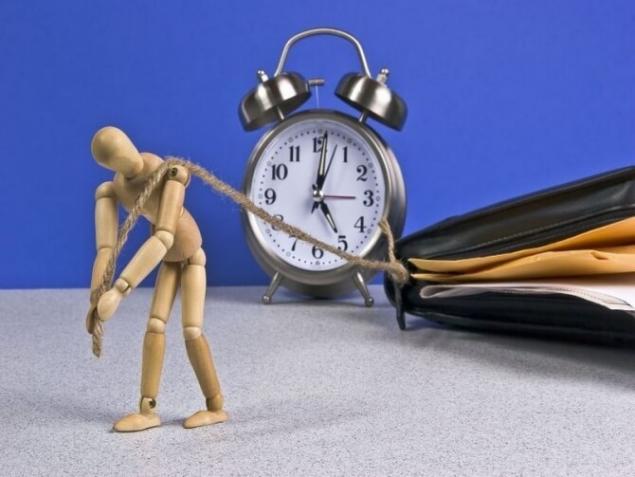1051
How not to go to work after 17:30 - 5 Tips from Cal Newport
We offer you 5 tips from Cal Newport, who works as a professor at the university, prepares 6 scientific articles per year, has written 4 books, leads a blog, a caring father and husband, but it never leaves work after 17:30

1. Lists of cases - is evil. Compose yourself
schedule Do lists themselves are useless. They only your first step. You must create a clear schedule. What for? This will help you plan out what you can do really. This will allow you to perform a specific task at a time when you will be able to execute it most effectively, and not just because it goes number four in the list.
Experts agree that if you do not count the exact time it takes to perform tasks, you advance doom yourself to failure.
Do you want to stop being a procrastinator? Schedule will help you. Here is what Cal:
Knowing that you have a clear scope of work planned out already reduces the desire to delay doing things. You do not think about whether or not to you now to work - a decision has been taken
. they do not go to work after 17, 30
2. Establish firm boundaries
Imagine that you are going to go home at 17:30, and then plan out things that will have time to do up to this time. The work will take a all the time you are allotted to her. Give her 24 hours seven days a week, and be sure the work will absorb all of these 168 hours.
Set yourself a deadline: you go home from work at 17:30. And then plan your volume of tasks that you will be able to master this time. Cal calls this performance due to tough schedule.
But do not forget that you should protect yourself from overtime. You have to feel that control your schedule. The more you feel in control of the situation, the less stress you are experiencing.
3. Make yourself
plan for the current week I think you will agree that short-term plans - it's not cool. If you think only about today, you never find yourself ahead.
That's what says about this Cal: "People do not like to look at the long-term plans, but forget what benefits they can bring to them. I know what I'm doing his every hour, every day of your. I know what I'm doing each of his week. I know what I do every month of his life.
Are you surprised? Do you think that it is particularly difficult for you? Easier than you think. What do I really need?
One hour in the morning on Mondays. Just. »
If you write a plan of cases, you'll stick with it more likely: you will have something tangible, not perfect, it will remind you of your priorities
. 4. Follow smaller tasks, but do it with enthusiasm
You should be less cases than we have now. Remember that not all of your business are important, what want to appear. Ask yourself: "What is really valuable to me in my life?". Then Cut off as much as possible unnecessary.
Here is what Cal:
We always appreciated for what we do best. So, if you want to be successful, not sprayed, let you perform smaller tasks, but you will be able to perform them more efficiently. People say "yes" too often. I have many, many say "no».
5. Focus on higher priority tasks
People who often work on weekends and at night, feel that they are doing much less than those who say goodbye to work at five o'clock. This is because they work a lot, but the importance of the tasks performed by them is small.
Let you be the time at which you dedicate only priorities. Getting started is not an easy thing?
The main thing - stop in the morning the first thing to check e-mail. Tim Ferriss, author of the bestseller "How to work 4 hours a week," explains it this way: "Try not to check e-mail in the first two hours after waking up. Yeah, maybe you really should get into your e-mail and gather information that will allow you to complete the task at 100%. But you can start to perform it at 80 or 90%, and then climb into your emails for more information. So you will save yourself the morning of unnecessary and extraneous details that are sure to switch your attention, and will be able to devote themselves exclusively to the work. "

1. Lists of cases - is evil. Compose yourself
schedule Do lists themselves are useless. They only your first step. You must create a clear schedule. What for? This will help you plan out what you can do really. This will allow you to perform a specific task at a time when you will be able to execute it most effectively, and not just because it goes number four in the list.
Experts agree that if you do not count the exact time it takes to perform tasks, you advance doom yourself to failure.
Do you want to stop being a procrastinator? Schedule will help you. Here is what Cal:
Knowing that you have a clear scope of work planned out already reduces the desire to delay doing things. You do not think about whether or not to you now to work - a decision has been taken
. they do not go to work after 17, 30
2. Establish firm boundaries
Imagine that you are going to go home at 17:30, and then plan out things that will have time to do up to this time. The work will take a all the time you are allotted to her. Give her 24 hours seven days a week, and be sure the work will absorb all of these 168 hours.
Set yourself a deadline: you go home from work at 17:30. And then plan your volume of tasks that you will be able to master this time. Cal calls this performance due to tough schedule.
But do not forget that you should protect yourself from overtime. You have to feel that control your schedule. The more you feel in control of the situation, the less stress you are experiencing.
3. Make yourself
plan for the current week I think you will agree that short-term plans - it's not cool. If you think only about today, you never find yourself ahead.
That's what says about this Cal: "People do not like to look at the long-term plans, but forget what benefits they can bring to them. I know what I'm doing his every hour, every day of your. I know what I'm doing each of his week. I know what I do every month of his life.
Are you surprised? Do you think that it is particularly difficult for you? Easier than you think. What do I really need?
One hour in the morning on Mondays. Just. »
If you write a plan of cases, you'll stick with it more likely: you will have something tangible, not perfect, it will remind you of your priorities
. 4. Follow smaller tasks, but do it with enthusiasm
You should be less cases than we have now. Remember that not all of your business are important, what want to appear. Ask yourself: "What is really valuable to me in my life?". Then Cut off as much as possible unnecessary.
Here is what Cal:
We always appreciated for what we do best. So, if you want to be successful, not sprayed, let you perform smaller tasks, but you will be able to perform them more efficiently. People say "yes" too often. I have many, many say "no».
5. Focus on higher priority tasks
People who often work on weekends and at night, feel that they are doing much less than those who say goodbye to work at five o'clock. This is because they work a lot, but the importance of the tasks performed by them is small.
Let you be the time at which you dedicate only priorities. Getting started is not an easy thing?
The main thing - stop in the morning the first thing to check e-mail. Tim Ferriss, author of the bestseller "How to work 4 hours a week," explains it this way: "Try not to check e-mail in the first two hours after waking up. Yeah, maybe you really should get into your e-mail and gather information that will allow you to complete the task at 100%. But you can start to perform it at 80 or 90%, and then climb into your emails for more information. So you will save yourself the morning of unnecessary and extraneous details that are sure to switch your attention, and will be able to devote themselves exclusively to the work. "























